The Translators: Marmaduke Pickthall, Yusuf Ali, and the Quran
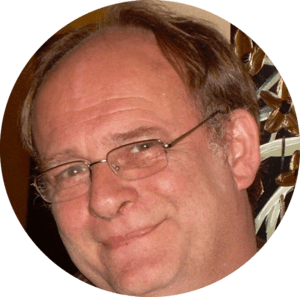
By Steve Noyes
Contributor
6/10/2019

Marmaduke Pickthall and Yusuf Ali, early 20th-century translators of the Quran, are buried in the Muslim section of the Brookwood Cemetery near Woking, Surrey, a half-hour outside London, once the largest cemetery in the world. Their graves are a few yards apart; they enjoy a neighbourly proximity they never experienced in life. Their only documented meeting was in 1917 in Woking when Pickthall converted to Islam (though it’s likely they met again at conferences in India). Pickthall’s headstone includes the Quranic verse (ayah), “One who is a true servant of Allah, no fear shall be upon them, nor shall they grieve.” Ali’s marker has his many titles, and “I am for Allah and to Allah I shall return.” Many Muslims who served Britain in WWI are buried here, as well as other key British Muslim figures: Arthur Quilliam, who founded the first mosque in Britain in Liverpool. Lord Headley and other British converts to Islam. Several officials of the late Ottoman Empire. Orientalist scholars. The Muslim graves are mottled and stained, and flicker alternately with the shadows of pine-branches and whitening shots of sunlight.
Once I had paid the necessary homage, I noticed a roadside map that made no mention of the Muslim section, although other sections were clearly marked. I found Ali and Pickthall’s graves because I already knew they were there. The missing information nagged at me. It said something about non-representation, a deliberate hole in history.
Pickthall and Ali were sincerely devout Muslims responding to their times’ claims of religion, nation, and culture, and buffeted by historical change and war. In turbulent lifetimes, which encompassed the collapse of two Empires, Ottoman and British, they succeeded in transmitting the central Muslim text into English. Initially, I was drawn to them because they seemed emblematic of conversions in opposite directions: Pickthall became a Muslim and Ali became an Englishman.
Pickthall became a Muslim and Ali became an Englishman.
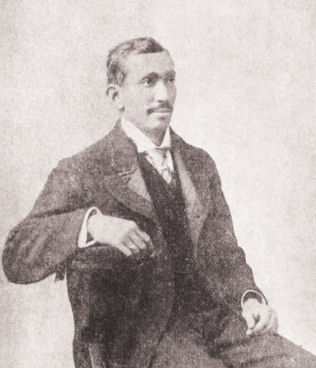
Yusuf Ali
Yusuf Ali was born in 1874 in Surat, a Guajarati-speaking city in India, into a Muslim family; his conversion to a lifelong loyalty to the British Empire happened in Protestant Christian schools and at Cambridge in England, where he studied law. He successfully passed the exams for the Indian Civil Service, returning to India as a district magistrate and tax-collector. His later career is best described as a mix of educational leadership in India, minor diplomatic efforts representing Indian Muslims, propagandizing on behalf of the British Home Office, publishing widely on Muslim history and culture, and private Islamic scholarship. His conversion was to an overwhelming political reality – the Raj – that formed him and set him somewhat at odds with the movement for self-government in India. Around 1920, after efforts to represent Indian Muslims at the Paris Conference and other parlays, he moved to Lahore and became headmaster of a Muslim boys school. Much of his later life was wildly peripatetic, as he crisscrossed the globe giving lectures on Islamic culture and history, attending educational and interfaith conferences, and once presiding at the opening of a mosque in Edmonton.
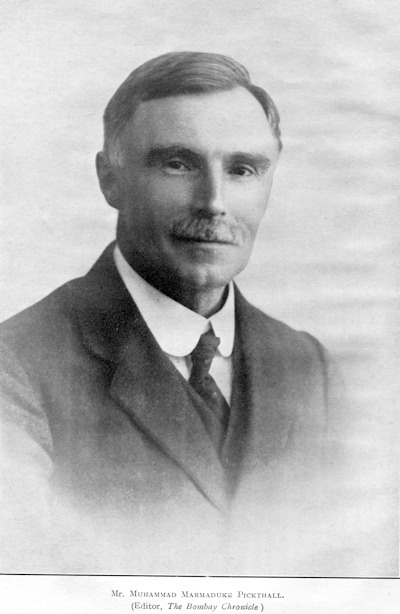
Marmaduke Pickthall
Marmaduke Pickthall was born in London in 1875, the son of a Methodist minister, and began his conversion in the early 1890s when he toured parts of what are now Israel, Lebanon, and Syria and learned colloquial Arabic. During his travels, he met with a sheikh in a Damascus mosque and expressed a desire to convert to Islam; the sheikh advised him to wait until he had a chance to be among his own people. Marmaduke waited until 1917 to convert to Islam – 25 years. He was a literary man, author of some 20 novels and story collections, set in both England and the Near East.
During the First World War, he disagreed publicly with British politicians about the fate of the Ottoman Empire and in particular clashed with a Foreign Office official, Sir Mark Sykes, who wrote to him saying, “I do not consider that it is proper that you should assume absolute friendship to an enemy state…and further speak in a distinctly hostile tone of your own government.” After this, Pickthall was convinced that Sykes had blackballed him; he was broke and opportunities in Britain had dried up. He left for India, first to edit the Bombay Chronicle and Islamic Culture, and then to serve the Nizam of Hyderabad as a headmaster and courtier.
Yusuf Ali, as a barrister, colonial officer, propagandist for the British government, and a regular socializer with the upper classes, never suffered this kind of suspicious scrutiny as a Muslim in England. Rather, he was elected to the Royal Societies of Literature and of Arts, and made a Commander of the British Empire. (In India, however, he was barred from the exclusive British clubs and gymkhanas.) His problems were rather closer to home. In 1920, Ali too left England for Lahore, in the long aftermath of a bitter divorce from an Englishwoman, Teresa Shalders, who had started an affair with one Obed Thorne during Ali’s long absences. Ali was resented by and estranged from his children, whom he left in the care of a governess as he continued to travel. In particular, his son Bloy, according to Dr Jamil Sherif, Ali’s first biographer, continued to torment him. He eventually cut his children out of his will. He alludes to these disappointments in the preface to his translation: “A man’s life is subject to inner storms far more devastating than those in the physical world around him. In such a storm, in the bitter anguish of a personal sorrow which nearly unseated my reason and made life seem meaningless, a new hope was born in the systematic pursuit of my long-cherished project. Watered by tears, my manuscript continued to grow…”
Their translations of the Quran, Pickthall’s published in 1930 and Ali’s in 1934, remain in print, and are widely regarded as the most veracious and accomplished translations by English-speaking Muslims. (Numerous previous translations into English were often incorrect, arranged eccentrically, or were meant to discredit Islam.) There is no telling how many English-speaking converts to Islam their translations have guided.
Sherif neatly sums up Pickthall and Ali’s main achievement. “They made English an Islamic language,” he said.
“They made English an Islamic language.”
Removed by time from their context, the lives of Pickthall and Ali are in the hands of a small group of academics and writers who study British Islam. A life retrospectively preserved in books has much clearer lineaments than the stream of impressions, events, and relationships which Ali and Pickthall lived; interpretations cannot help being reductive, however expert. Both translators were successful and indeed privileged people, but they faced obstacles because their lives straddled many borders – Pickthall, because of his Turkish sympathies during WWI, was increasingly watched with suspicion by the upper-class English; Ali was frustrated by prejudice in the India Civil Service that denied him further promotion.
For Sir Peter Clark, author of Marmaduke Pickthall: British Muslim, Pickthall’s importance is bound up with his courage, and is beneficial to Muslims and non-Muslims alike: “Pickthall, like many Muslims in a non-Muslim environment, was on the defensive. For centuries there has been a distortion and defamation of Muslims. With great personal courage and integrity, he confronted this hostility with his writings. There was, and is, a global community of Muslims…and many internal conflicts within the world of Islam. With his roots in English society, an understanding of Pickthall and his work helps us to understand that there is, for non-Muslims, nothing alien about Islam…and helps people understand each other and reduces inter-faith cultural tensions. His translation of the Holy Quran…has been for many the bridge to an understanding of Islam, and for some…the bridge to embracing Islam.”
Dr Humayan Ansari, in The Infidel Within, portrays Yusuf Ali’s life as a strategy meant to curry favour with the British upper-class establishment, like other elite Indians of the time, an attitude Ansari characterizes as “deference if not obsequiousness.” He makes Ali sound like the ultimate colonial toady, and it is certainly true that Ali admired the British, thinking that the “Anglo-Saxon love of organization and progress had put them at the head of human progress.” He maintained staunch support for the British Empire long past its best-by date, even when Indian independence was assured. Ansari notes that Ali’s WWI propaganda urging Indian Muslims “to die for country, Padishah, crown and Empire” was described at the time as “cringing” and “sycophantic,” and he correctly observes that “predictably the government regarded him as the pre-eminent Muslim spokesman in Britain.”
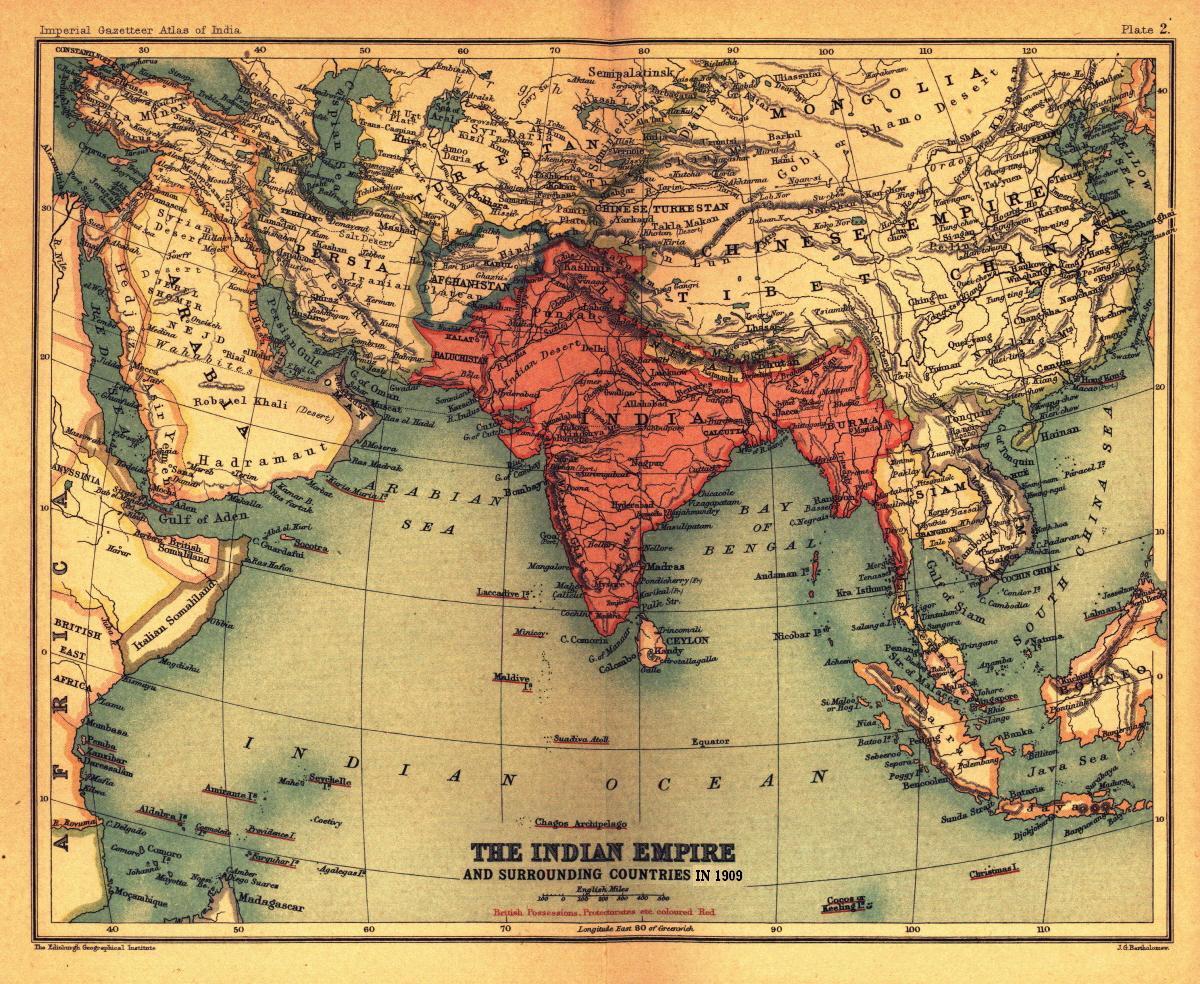
The British Indian Empire and surrounding countries in 1909
Sherif grew up in a household where Ali’s Quran translation was the only Muslim book. When the old London Mosque was torn down in the early 1980s, he stumbled upon a scrapbook full of Ali’s press clippings, nudging him towards becoming Ali’s biographer. He sees much consistency across Ali and Pickthall’s religious visions, and their legacies consist of Islamic scholarship and services towards improved Muslim education. “The two men came from different milieu and held contrasting political allegiances but were remarkably similar in their religious insights. In one of his last essays, The Idea of Salvation in Islam, Yusuf Ali notes the cry of man, “Vanity of vanities! All is vanity!” An oft-used phrase of Pickthall’s was “Die before you die.” Both are allusions to the transient glitter and glamour of material existence.”
Sherif also stresses their early piety. Pickthall was deeply spiritual even before he became a Muslim, for example fasting on the day of his marriage in respect of the Christian vows. Yusuf Ali, while a 19-year-old scholar at Cambridge, would come to London to participate in Muslim gatherings and recite poetry in praise of the Prophet.
Dr Geoffrey Nash said that though some of Yusuf Ali’s commentary on the Quran is idiosyncratic and unorthodox, he deserves respect for “attempting to interpret the Quran’s many meanings by his own lights.” As for Pickthall, Nash remind us that his sermonizing at the Woking Mosque was a continuation of Arthur Quilliam’s earlier work in Liverpool. Quilliam strove to present Islam in a way that made sense to the English. In his journal The Crescent, he interspersed religious articles with articles about the developing sciences, and discussed the Muslim prohibition against alcohol in terms of the Temperance Movement.
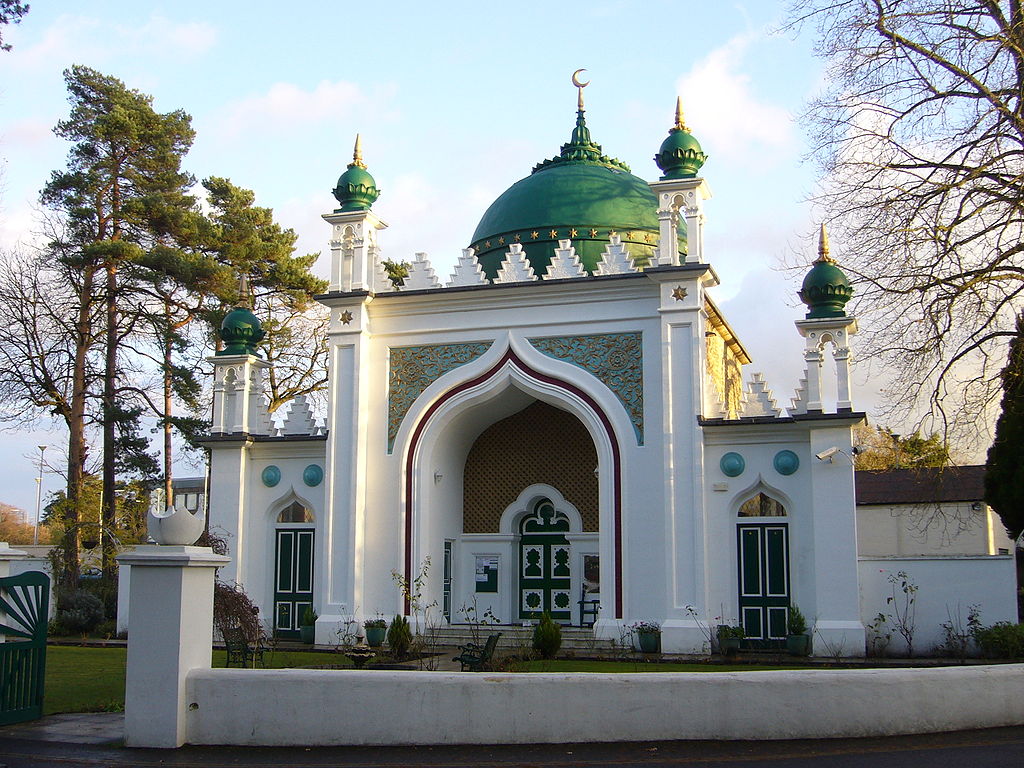
Woking Mosque
By the time Marmaduke and Yusuf were young men, in the 1890s, there had been throughout the 19th century a rich tradition of debate about the need to either reform Islam, to make it compatible with the growing power and technological superiority of the West, or to purify Islam by returning to the preferable state of the Prophet Muhammad and his Companions. A number of solutions were argued for: pan-Islam, reinstating the authority of the Caliph, Arab nationalism, a more fundamentalist Islam, adoption of the West’s legal and educational systems, insurrection. The debate took place in many countries: Algeria, Tunisia, Egypt, Lebanon, Arabia, the Ottoman Empire itself, and the statement of the problem and its proposed solutions fall into three main trends.
One: Islam was in danger because of its decline as a civilization and should accept the West’s domination and adopt its legal codes and its technology – to secularize government – and strive towards individual Muslim nationhood for geographical entities, if necessary by cooperating with the European colonizers.
Two: Islam is rational, democratic and can form the basis of effective government – it just needs to be tweaked. The colonizers can teach us many useful things, but they are also dangerous and must be resisted, as they will undermine our moral and spiritual way of life. The question is which aspects of the West will we refuse and which accept.
Three: The only basis for Muslim societies and mankind’s general well-being is the Quran, and the practices and sayings of the Prophet. Through too much rapprochement with the West, too many deviant Islamic folk beliefs, and too little attention to the core of our religion, Islam has dangerously drifted away from its roots. We must return to the purity of the earliest Muslims if we hope to improve our lot.
It does not take much imagination to see in these positions the emerging lineaments of our present world. Nationhood, religious orientation, resistance to encroachment: these are tensions still in evidence today, and Pickthall and Ali’s lives illustrate this conceptual struggle between ideas East and West, First World and Third World, secularism and theocracy. The translators played a minor role in these debates, but the major political projects they espoused – Pickthall a renewed Ottoman Empire, Ali a British-ruled India – were doomed by history. The Raj and the Sublime Porte are gone, but the geopolitical shape of nations was and is still influenced by the colonizers.
Pickthall’s and Ali’s translations of the Quran were published in the 1930s to wide acclaim, the result of extended and concentrated labours, Pickthall finishing his over two years of leave granted by the Nizam of Hyderabad, and Ali working on his during his frequent long steamship voyages. Their work has not gone uncriticized. It could hardly be otherwise. The Quran, composed of 114 suras, some well over 250 verses long, is a daunting text to translate. It is in classical Arabic, fush’a, a language with absolutely no similarities, whether of vocabulary, syntax or orthography, to English. Hardly a day goes by without a new paper being uploaded to Academia.com that analyzes and criticizes some aspect of their translations, criticism being the sincerest form of literary flattery.
Hardly a day goes by without a new paper being uploaded to Academia.com that analyzes and criticizes some aspect of their translations.
They also faced some opposition when the translations were being completed in the 1930s: Pickthall from the learned scholars at Al-Azhar mosque in Cairo; Ali from literary Indian Muslims who thought his translation was full of errors because of his imperfect knowledge of the Arabic idiom.
Their handling of these criticisms says something about their personalities. Pickthall travelled to Egypt to lobby the religious scholars at Al-Azhar University, gaining their approval by exploiting a difference of opinion among the university’s board, half of whom thought translation of the Quran was necessary, and half of whom thought it impossible and indeed blasphemous. When told he must obtain a fatwa to approve of his work, Pickthall simply said he already had one, from an imam in India. The impression is of Pickthall as a skilled tactician who found allies wherever he went.
Yusuf Ali, on the other hand, did not seek to have his translation approved by Arab Muslim scholars. His response to criticism of his Arabic is redolent of a bruised defensiveness that decades of being feted on three continents did little to reduce: “I had not imagined that so much human jealousy, misunderstanding and painful misrepresentation should pursue one who seeks no worldly gain and pretends to no dogmatic authority.” Perhaps this is why where Pickthall translates a Quranic phrase as “rancour,” Ali translates the same phrase as “a lurking sense of injury.”
Their knowledge of Arabic may not have been perfect or fluent, but Ali learned Arabic from his father from an early age, and Pickthall by the nineteen-teens was giving khutba, or sermons, in Arabic at the Woking Mosque, and both men wrote widely and deeply on many Muslim subjects throughout their careers displaying impressive familiarity with many aspects of previous Islamic scholarship.
Dr Peter Clark, Pickthall’s biographer, said that Pickthall was an autodidact who taught himself Arabic, and that “he wore a mask of arrogance at times, the outward expression of a lack of self-confidence, and had no guru or mentor.” Pickthall was not modest about his Arabic abilities. In Anne Fremantle’s Loyal Enemy, another Pickthall biography, she quotes from Pickthall’s correspondence: “my knowledge of Arabic is better than that of the Muslim ‘ulema (religious scholars).”
Pickthall did not attempt a tafsir, a commentary on the Quran, limiting himself to an introductory essay on the life of the Prophet, but Peter Clark calls his essay “The Cultural Side of Islam,” published in Islamic Culture in 1927, an eloquent and articulate statement of liberal Islam. For Pickthall, Islam is based on reason, and he quotes a hadith where Muhammad says (or is said to have said): “The first thing created was reason.” For Pickthall, Islam is eternally fresh and more than up to the challenges of the age – indeed he praises “the wonderful modernity of the Holy Quran and so much of the Prophet’s teaching,” but he stresses “the importance of distinguishing once and for all between the living body of Islamic teaching and the folklore that has been thrown about like a garment of an antique fashion.” Moreover, Islam is optimistic, not fatalistic, and encourages human effort towards self-improvement. He recalls Damascus, Aleppo, and Jerusalem in the 1890s and writes, “What struck me, even its decay and poverty, was the joyousness of that life compared to anything I had seen in Europe.” He offers Islam as an alternative to “Communism, Socialism, Bolshevism, and all the other Isms.”
Writing in the same journal on “The Religious Polity of Islam,” Yusuf Ali strikes some of the same notes, but for him Islam is a marker on the way to greater progress – rather than eternally true. “The Prophet pointed the way towards a non-tribal, non-sacerdotal, non-autocratic state.” Ali, like Pickthall, sees Islam as rooted in practical, everyday life, pointing out that Muhammad “always followed precept with example,” but goes a little further than Pickthall in characterizing it as a “lay religion.” He thinks one of the causes of Islam’s decline is that it has become “priest-ridden.” He believes that Islam is not incompatible with adopting the legal codes of European nations.
Though their emphases were different, both men presented a moderate, tolerant Islam, as a viable political and social possibility for the modern world. Nash calls this “a modernity in which Islam could not only fit but could lead.”
We know more about Yusuf Ali’s thoughts on the Quran than Pickthall’s because of the elaborate commentary (tafsir) Ali published alongside his translation. Ali was often inclined to strike off in an overly interpretive, mystic vein. As the Quranic scholar Dr Abdurahim Kidwai says, “However, it is seen that some of his notes on heaven, hell, and angels reflect his Sufism and overemphasis on spiritual matters, and are blended with the pseudo-rationalist spirit of his times.” Indeed, Ali believed that the Quran is the expression of universal truths common to all religions that only refined persons like himself can appreciate. “In my view the religion of all thinking men is the same, however different may be the philosophy by which they explain their spiritual instincts, or the molds in which they cast their spiritual hopes.” He gives the impression of favouring a synthetic universalist spirituality, a religious Esperanto, akin, perhaps, to Theosophy.
The Quran itself says that it contains verses both literal and metaphorical in meaning, but “only Allah knows the meaning of the metaphorical passages.” In his commentary, Ali sails past all that, and writes an entire essay on the allegorical meaning of the story of Yusuf (Joseph) and Zuleikha, Pharaohs’ wife: a sermon exemplar about a Platonic spiritual love that emerges after the fires of passion are spent. When translating a verse from Sura The Break of Day as “by the alternation of even and odd,” one in a series of paired opposites, Ali comments analogically, “Both abstract and concrete things are often understood in contrast to their opposites. Why should we not, in spiritual terms, understand our life better with reference to the Hereafter?”
***
For all that difference between the literal and the mystical, Pickthall and Ali’s translations of the Quran are not overly dissimilar. They both chose to write in an antique register resembling in verb forms and pronouns Elizabethan English, the language of Shakespeare and Jonson, in order to capture the elevated Arabic of the Quran, so highly revered by Muslims because they believe it is the word of God transmitted by the angel Jibreel to Muhammad. It sits squarely at the center of all Arabic literature. It is Arabic par excellence, or as Allah says, “’arabiyya mabiin,” clear Arabic.
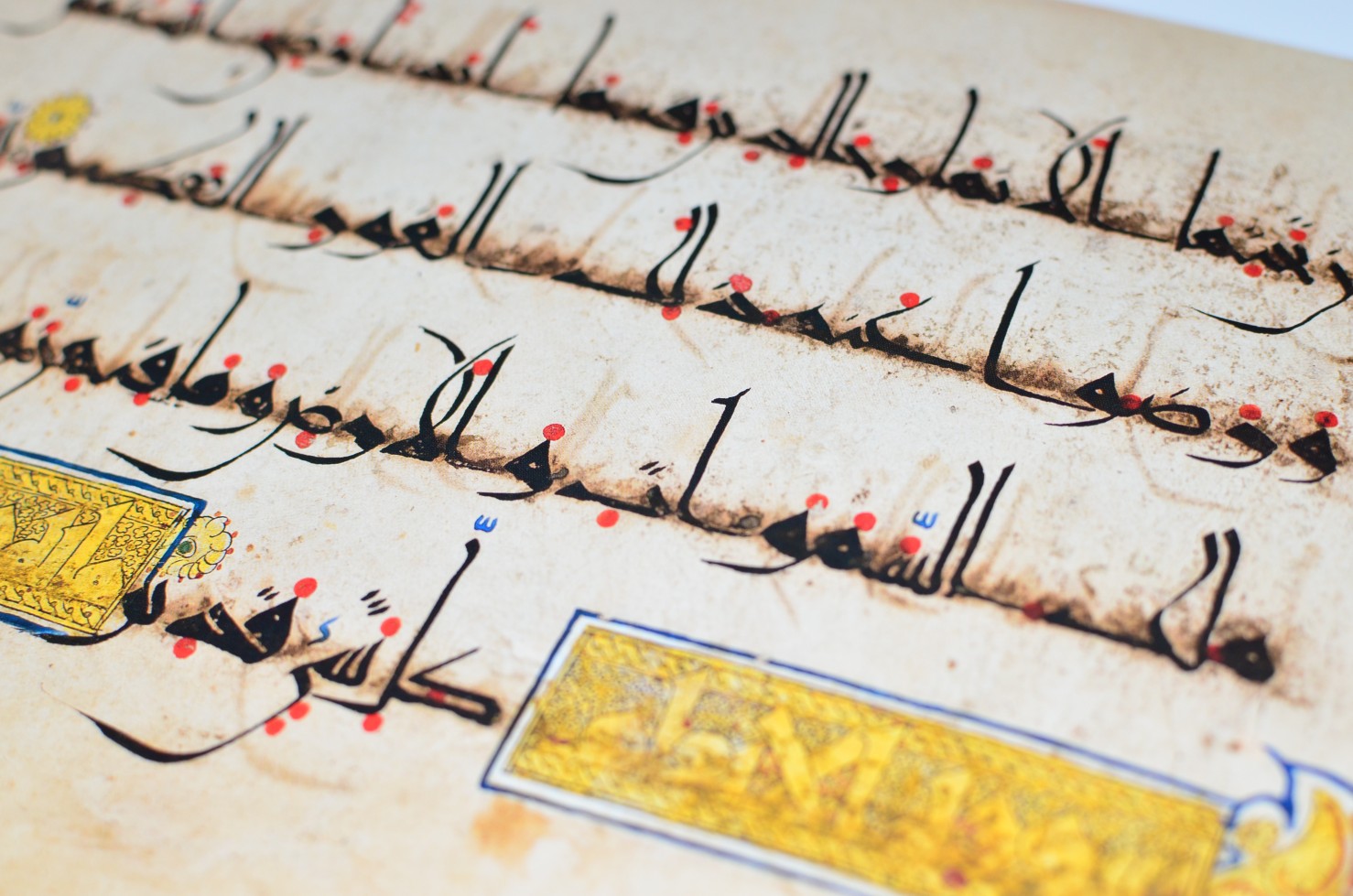
The Quran itself is explicit about its unparalleled nature. It challenges the Arabs to produce one ayah or verse as good as the Quran’s and warns them: “of a surety you cannot.” A strong Muslim belief, therefore, is that the Quran cannot really be translated; one can only point towards its meaning, give a rough sense. Translation is a losing game at best, because something must be lost in a text’s journey to the target language. In the Quran its sonic effects, masterful cadence, the intricate pairings of its phrases are lost. The translator cannot capture the percussive immediacy of the first line of Sura The Father of Flame: TaBBaT yada aBu lahaB wa TaBBa. (Perish the father of flame, perish he.) One must settle for the repetition but not the brisk tattoo of Ts and Bs. Similarly, one cannot replicate the matched and rhymed phrases in Sura The Merciful:
Ar-raHman
‘alama al-Quran
khalaqa al-insan
‘allamahu al-bayan
ash-shamsu wa al-qamar bihisbaanin
wa an-najmu wa ash-shujra yusjidaani
The English must lengthen, because it adds pronouns and auxiliary verbs and is not as rich in rhyme as Arabic. Thus Yusuf Ali translates, as sparely as he can:
The Merciful,
He has taught the Quran,
He has created Man,
He has taught him speech (and intelligence),
The sun and the moon follow courses exactly computed,
And the herbs and the trees – both (alike) bow in adoration.
One of the Quran’s signature characteristics is iltifah, “turning,” the ability to glide between several points of view and rhetorical strategies within a few lines, forcing the translator to add context or assumed information, to specify the speaker and the spoken-to. Iltifah is wholly appropriate for the diverse material the Quran narrates, often in one sura, everything from imagistic visions of the Day of Judgment to legal and social precepts, from accounts of the fates of earlier nations to descriptions of the physical universe, from long dramatic stories to Allah’s attributes. From the first part of the Sura Yusuf (Josef), this passage illustrates iltifah in the movement between the voices of Allah and Yusuf, and between framing invocation and direct speech:
Yusuf Ali: We do relate unto thee the most beautiful of stories, in that We reveal to thee this (portion of the) Quran: before this, thou too was among those who knew it not. Behold! Joseph said to his father: “O my father! I did see eleven stars and the sun and the moon: I saw them prostrate themselves to me!”
Pickthall: We narrate unto thee (Muhammad) the best of narratives in that We have inspired in thee this Quran, though aforetime thou wast of the heedless. When Joseph said unto his father: O my father! Lo! I saw in a dream eleven planets and the sun and the moon, I saw them prostrating themselves unto me.
At the level of diction, there are cases where one of them is wrong. In Sura The Day of Clamour, Pickthall mistakes umm (home, abode, refuge) for um (mother), writing, “A bereft and Hungry One will be his mother,” while Ali writes “Will have his home in a bottomless pit, like most other translators (pit, abyss, hole, etc.) In the Sura The Elephant, Pickthall translates the words ’aSfin makuula as “green crops devoured (by cattle)” and Ali as “an empty field of stalks and straw, (of which the corn) has been eaten up.” Ali is right: the Arabic word ’aSfin means straw.
Usually it is Pickthall who remains literal, while Ali grants himself more license to give a parable-like version of the Arabic. In Sura The City, Pickthall translates, “And thou art an indweller of this city – By the begetter and that which he begat, We verily have created man in an atmosphere,” whereas Yusuf Ali translates, “And thou art a freeman of this City; By (the mystic ties of) parent and child; Verily We have created man into toil and struggle.”
***
Pickthall and Ali’s literary output was impressive. Pickthall published 20 novels and short story collections; Ali wrote many non-fiction books, mostly about Indian Muslim law, culture, and history. Both were regular contributors to many journals and could display impressive erudition on many Islamic subjects.
Marmaduke begins his literary career with a rollicking account of his travels through Lebanon and Syria, Oriental Encounters, placing himself within a tradition of English visitors to the Middle East that included Richard Burton, Alexander Kinglake, and Charles Doughty. It is easy to sense Pickthall’s exhilarating freedom in his travels, a smothering background cast off and a Lo! Let us sally forth! spirit taking hold. He faithfully records people’s manner of speech and folk-religion stories which were to influence his Islamic novels. In Said the Fisherman, his first success, he has his Middle Eastern characters talk in an elevated, pious way, the manner thrown over their underlying rapacity – highly reminiscent of Dickens’s portrayals of the criminal class. But he also offers, for his times, a rare display of negative capability. Said is brutally shanghaied and shipped to England, where he wanders, lost, through a hallucinogenic Victorian London sharpened by starvation and despair; a tour de force fully comparable to another classic of vagrant disassociation, Knut Hamsun’s Hunger.
In 1914 after a stay in Istanbul, Turkey, Pickthall published With the Turk in Wartime, wherein he reports on WWI from the point of view of the Turks, and argues for the abandonment of the British pro-Russian, pro-Christian Balkan policy in favour of preserving the Ottoman Empire, feeling that the Turks were the best upholders of Islamic civilization, a stance he held to throughout the war. This led to conflict with a senior British official, Sir Mark Sykes, who denied him a visa to go to Vienna in order to open up a pro-Turkish diplomatic back-channel. This was crucial: it resulted, or so he powerfully believed, in his blackballing; opportunities dried up for him in England and in 1920 he was forced to leave for India.
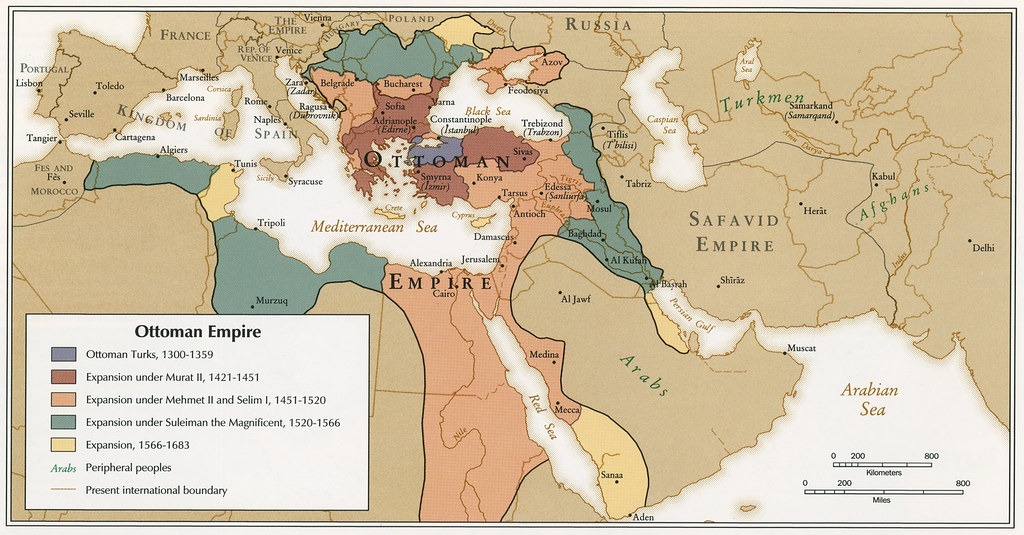
His frustration with the English elites comes out in his richly ironic novel Sir Limpidus. The title character is a walking example of privilege, insularity and insensitivity – the quintessence of Englishness so deeply rooted it need not be explicitly expressed. “He was the thing, the very thing, the thing itself.” “Limpidus, you seem born to greatness, because you always think exactly what an Englishman of your position ought to.” Here, Limpidus asks about the propriety of a political assassination in the Balkans:
“But isn’t it going a bit too far?”
“It is considered not unusual in these latitudes. It is a recognized method of Eastern diplomacy.”
“Oh, if you’re sure it’s always done…”
By the end of the novel, rudely buffeted by unionized workers, cleverer colleagues from the merchant class, suffragettes, and appalled by the “vile irreverence, the criminal ingratitude which lurk among the lower orders of society,” Limpidus welcomes the First World War, “to bring them back to their senses.”
With Yusuf Ali, the career Indian Civil Service bureaucrat, his first literary efforts were non-fiction books, written, no doubt, as career assignments, on silkworm culture in India, and, more broadly, on Indian life, industry, and customs such as Life and Labour of the Peoples of India. The book on silk is remarkable for it reveals his imperial vision of a land where the Indian silk-workers are an anonymous mass, toiling at their immemorial tasks. The only people named are foreign innovators in silk cultivation. In Life and Labours, the imperial mask is even more firmly affixed. Though his descriptions of Indian village and town lie are precise – the number of baskets for sundries in a shopkeeper’s hut; the “dust-time” when cattle are driven home; the mud-ridged paths across fallow fields – they are reported in timeless present tense, as though depicting a long-running, rather static stage-play called Village Life, bereft of individual feeling or variation. Indeed, he writes: “The idea about the ‘mystery of the East,’ about there being huge cavernous depths of feeling and thoughts over which English ideas merely float like foam, is not true.” Despite his lifelong study of Arabic and Islam, his vision of a moribund Indian civilization harshly judges the men of “the old learning:”
Their dreams are centered in those nooks and corners of history to which the light of modernity has never reached. Their ideals have never adjusted themselves to the demands of modern life…from them, no progress can be expected.
In India and Europe: A Study in Contrasts, Ali sets up a (false) dichotomy between East and West, and it is clear which side he plumps for: “[The Eastern view is that] life should be governed by mainly spiritual forces” while the Western view is that “social life should be regulated by law and the magistrate and armed forces of the state.”
They both had crossed cultures early in their careers, and tried to portray the distances, but had not yet acquired the erudition to translate the Quran.
Pickthall and Ali’s world was fundamentally different from ours. It was more radically separated. Journeys from the Western world to the East took weeks by steamship, not hours. News from distance countries – especially non-imperial publications – arrived in London weeks or months later, travelling slowly back by mail through the Empire. The fact of Empire determined the economies of entire continents, branch-plant producers of commodities for the imperial rulers. A photograph from Felix Barker’s Edwardian London suffices to evoke this rapacity. On a foggy dock, five long lines of elephant tusks are laid out on the planks, stretching for hundreds of metres, past the thumbnail-sized figures of two men, towards but never reaching the vanishing point. An official association with the British Empire guaranteed one instant access to the highest levels of society worldwide. Pickthall, within hours of arriving in Istanbul, was drinking with Turkish cabinet ministers. Yusuf Ali lived for a while at one of the great English country-houses, where he socialized with Lord Morley and other aristocrats.
In the translators’ lifetimes, while Empires waned, and wars brought new treaties, we see the creation of new nation-states, notably in the Middle East, disrupting the notion of a Muslim ’umma, or international community. The arbitrary identification of masses of people with nation-states (and the resulting conflicts) is the 20th-century story.
It was also an age of explicitly sanctioned bigotry, bringing to mind the Canadian poet Al Purdy’s line about his Loyalist ancestor’s stern portrait, “about to condemn the morals of an entire population.” The zeitgeist was rife with notions of social Darwinism and superior and inferior races: the superior races, in this mind-set, were European, fit to rule; the inferior ones were the colonized, fit to be ruled. Even language was assumed to be cause and effect of this world-order. In Otto Jesperson’s History of the English Language (1905), he states that English is essentially manly, rational, given to sensible and practical order, while native languages are lazy, effeminate, lacking in vigorous meaning.
Both Pickthall and Ali displayed occasional flashes of this essentialist mentality. Pickthall, indubitably influenced by the prejudices of the Young Turks he so admired, wrote, “The Turks, as a white race, have a natural precedence over the many colored races of the Muslim world.” He also called the Armenians a race of “traitors, spies, blacklegs, perjurers, lickspittles, liars, utterly devoid of shame or honour,” adding that this was “not a pleasant thing to write, but it is true.” Yusuf Ali was so enamoured of the English that he called them “the natural rulers of India,” because of their “superior organizing ability of their civilization,” while deploring the Indian Muslims’ lack of organization (“Many of our organizations are merely nominal”) and passivity (“we have been content to dream of our past and neglect our present and future.”
When we look at lives from past eras, what can we expect to find but attitudes we disapprove of and defunct political projects? The temptation is to read Pickthall and Ali’s political allegiances through a highly critical post-colonial lens, whereas, seen within their lifetimes, their political allegiances and causes are a mixed bag, nuanced, not entirely rigid. Both men supported restoring the Caliphate in some form, as a Pan-Islamic symbol and unifying glue for the Muslim umma, or nation, after Ataturk had abolished it within Turkey. For Pickthall, the Caliphate should return to his beloved Turkey; for Ali, the khilifat movement was bound up with many swirling political developments in India – including Muslim-Hindu cooperation – as the movement for swaraj, self-rule, gathered force. However, Pickthall participated in many of Gandhi’s non-cooperation demonstrations; Ali, the Empire loyalist, did not.
Pickthall and Ali’s political allegiances and causes are a mixed bag.
Sherif has also noted some of their actions were “out of keeping with their nobility of spirit. Yusuf Ali for example was a lifelong admirer of the British, and while many contemporaries supported the Ottoman cause during the Great War, he was a willing Empire propagandist. Pickthall donned a British Army uniform in 1918 (while Britain was fighting the Ottoman Empire) rather than declare himself a conscientious objector.
“Their lessons are to accept the ambiguities and inconsistencies in people’s lives, and desist from being judgmental,” Sherif said. Or, as Albert Hourani, the great Arab historian, wrote: “But in real life, contradictions need not be resolved; they can be lived.”
Anne Fremantle, Pickthall’s first biographer, knew him as a little girl, and confessed to him an overwhelming fear of death. Pickthall, distressed by her irrational terror, comforted her by saying, “Allah makes everything easy for his servants, even death.” Pickthall died in 1935, suddenly and unexpectedly, of a heart attack, while on holiday with friends in Cornwall, intending to return to India for another term serving the Nizam of Hyderabad. Yusuf Ali lived much longer in a steadily gloomy and isolated twilight, first as a silent old man living at the National Liberal Club in London, and then wandering the streets of London, destitute and senseless, clutching all his belongings. As he had translated: “If We grant long life to any, We cause him to be reversed in nature.” He died of a heart attack too, in 1953, after being found on a doorstep and taken to hospital, and there was so little notice taken of his death that the Pakistani High Commission had to organize the funeral.
Ansari draws a rather forceful line between Ali’s social-climbing and his lonely end, implying that the upper English classes whom Ali loved so had abandoned him. Nash is less inclined to read Ali’s death as the result of his overly-trusting Anglophilia; he suggests that an Arabic idiom is more to the point: qaDaa’ wa qadara, “by fate and divine decree,” meaning that Ali’s demise was a transcendent, not a social, inexorability.
In Brookwood Cemetery, there is now an interpretive trail, with Pickthall’s and Ali’s graves duly marked and their achievements noted. The Woking Council has agreed to remove the sign that had for so long blotted out their memory.
